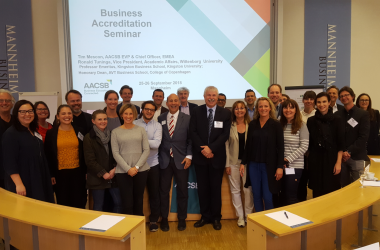Witenborg VP Co-Presents AACSB Seminar

"AACSB is One of the Most Important Accreditation Organisations for Business Schools"
On September 25 and 26, a seminar on AACSB standards and processes took place at the University of Mannheim in Germany. In the seminar, participants from business schools and universities in more than 10 countries in Europe and the Middle East exchanged their views and understanding of the AACSB accreditation process. The seminar was co-presented by Prof Ron Tuninga, Vice-President of Academic Affairs at Wittenborg University of Applied Sciences, and Tim Mescon, Executive Vice-President of AACSB.
Wittenborg obtained AACSB membership last year with an eye on eventually gaining accreditation for its IBA and MBA programmes with this prestigious organisation. It is the mission of AACSB to “foster engagement, accelerate innovation and amplify impact in business education”. In line with its mission, AACSB has become one of the most important accreditation organisations for business schools and universities.
The seminar in Mannheim covered all 15 standards that business schools and universities need to meet for AACSB accreditation. Mescon and Tuninga also explained the processes for initial and continued accreditation. Most participants came from business schools and universities not yet accredited by AACSB.
Prof. Ron Tuninga provided insights on, for example, how mission and strategy play an important role for the development of distinctive intellectual contributions and a high-quality mix of academic and professional faculty members. A high-quality academic faculty with sufficient research output provides an important foundation for high-quality business education. Examples from the rich experience of Tim and Ron were the basis for discussions around the various AACSB accreditation standards.
A clear understanding of the AACSB standards is an important starting point for the process of accreditation, leading to a cultural change in most business schools and universities. In particular for the universities of applied sciences, this often means having to implement policies and new ways of working with respect to high-quality applied research, which is disseminated in good peer review journals. High-quality applied business research output not only helps businesses and organisations in society, but is also important in providing state-of-the-art business and management education.
WUP 3/10/2018
by James Wittenborg
©WUAS Press
366 words